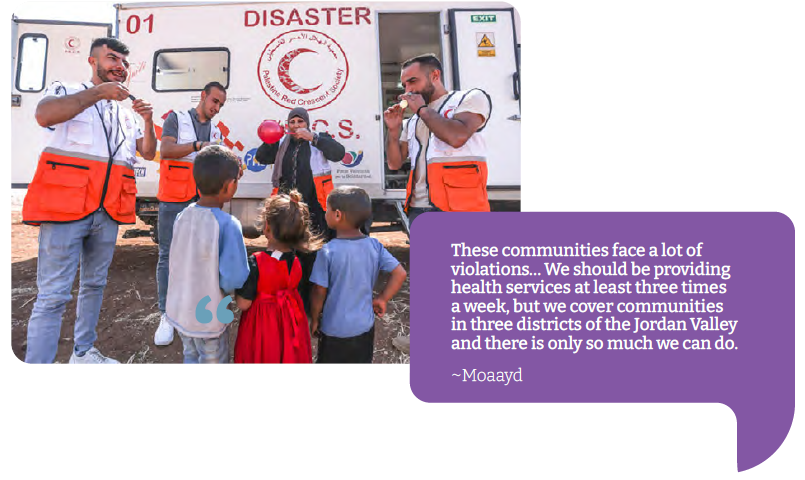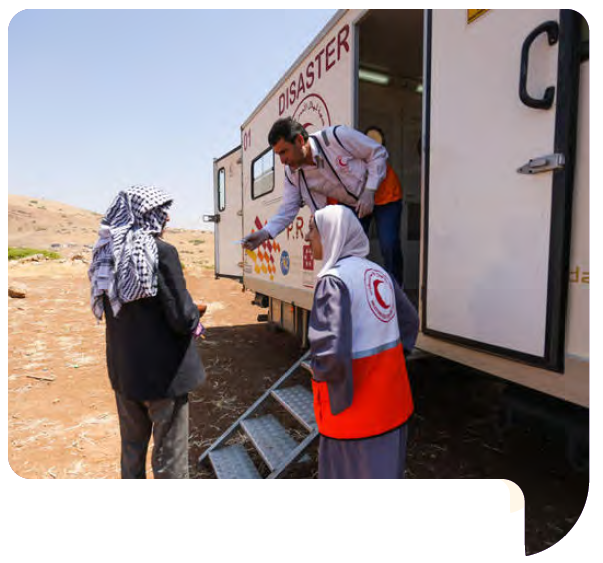Moaayd is the driver of a mobile clinic for the Palestine Red Crescent Society (PRCS) operating in the Jordan Valley of the West Bank. He has been part of the team for 10 years, working with communities in remote areas that depend on mobile clinics for access to primary health care. The communities face obstacles to planning and development, demolition orders that make their lives and livelihoods precarious and uncertain, and the under-provision of basic services.
Bank. He has been part of the team for 10 years, working with communities in remote areas that depend on mobile clinics for access to primary health care. The communities face obstacles to planning and development, demolition orders that make their lives and livelihoods precarious and uncertain, and the under-provision of basic services.
“These communities face a lot of violations. The Red Crescent tried four times to assist with building six houses to provide emergency shelter, but each time the houses were demolished… We should be providing health services at least three times a week, but we cover communities in three districts of the Jordan Valley and there is only so much we cando. To reach all communities, the mobile clinic needs to serve two or three communities at a time. Here in Khirbet Al-Meiteh, some people need to walk half an hour from nearby communities to reach us,” Moaayd comments.
Khirbet Al-Meiteh is a community served by Moaayd’s team, located in Wadi Al-Maleh in the northern Jordan Valley, in the governorate of Tubas. The community of 300 people is situated in Area C, where Israel maintains civil and military control. It lies in an area designated as a firing zone, meaning severe restrictions on planning and development, including for roads, schools, and health facilities. Residents rely on agriculture and pasture for their livelihoods, which are threatened by land confiscations and expanding settlements in the surroundings. There is lack of adequate protection for the communities, who experience settler- and occupation-related violence and who face loss of livelihoods due to destruction of crops and attacks against livestock.
The nearest permanent primary care facility is in Tubas, which would be around 30 minutes away by car without unpredictable checkpoint delays. Many in Khirbet Al-Meiteh do not have a vehicle, so the mobile clinic serves as a vital lifeline for the community. However, the community remains underserved, with expansion of service provision and establishment of permanent facilities needed.
“The mobile clinic covers part of the needs for our community in Wadi Al-Maleh,” says Mahdi, a member of the community council. “However, we desperately need a permanent facility. We tried to build two rooms last year to use them as clinics, but Israeli forces demolished the rooms. We’ve been unable to build them again due to lack of funding.”
The PRCS clinic Moaayd works for covers Tubas, Nablus, and Jericho. Each community or cluster of communities served by the mobile clinic receives one or two visits a month. The clinic itself operates five days a week, providing primary health care on three days and services for women’s health on two days. The team consists of a driver, nurse and doctor, with a social worker joining the team on occasion. Recently, the PRCS community service programme was able to offer additional support to the communities in Wadi Al-Maleh, training youth in the provision of first aid to offer immediate support to injured persons and responding to the high numbers of casualties during demonstrations against settlement expansion.
“As a resident of Tubas, Wadi Al-Maleh is very close to my heart,” Moaayd says. “I feel connected to the people here, and I understand their suffering because I live their

experience too. When the community faced demolitions, I was there to help. Despite all our efforts, we need to do a lot more. I’m happy we can provide at least basic health services, but our communities deserve comprehensive health care like all people.”
Moaayd is the driver of a mobile clinic for the Palestine Red Crescent Society (PRCS) operating in the Jordan Valley of the West Bank. He has been part of the team for 10 years, working with communities in remote areas that depend on mobile clinics for access to primary health care. The communities face obstacles to planning and development, demolition orders that make their lives and livelihoods precarious and uncertain, and the under-provision of basic services.
Bank. He has been part of the team for 10 years, working with communities in remote areas that depend on mobile clinics for access to primary health care. The communities face obstacles to planning and development, demolition orders that make their lives and livelihoods precarious and uncertain, and the under-provision of basic services.
“These communities face a lot of violations. The Red Crescent tried four times to assist with building six houses to provide emergency shelter, but each time the houses were demolished… We should be providing health services at least three times a week, but we cover communities in three districts of the Jordan Valley and there is only so much we cando. To reach all communities, the mobile clinic needs to serve two or three communities at a time. Here in Khirbet Al-Meiteh, some people need to walk half an hour from nearby communities to reach us,” Moaayd comments.
Khirbet Al-Meiteh is a community served by Moaayd’s team, located in Wadi Al-Maleh in the northern Jordan Valley, in the governorate of Tubas. The community of 300 people is situated in Area C, where Israel maintains civil and military control. It lies in an area designated as a firing zone, meaning severe restrictions on planning and development, including for roads, schools, and health facilities. Residents rely on agriculture and pasture for their livelihoods, which are threatened by land confiscations and expanding settlements in the surroundings. There is lack of adequate protection for the communities, who experience settler- and occupation-related violence and who face loss of livelihoods due to destruction of crops and attacks against livestock.
The nearest permanent primary care facility is in Tubas, which would be around 30 minutes away by car without unpredictable checkpoint delays. Many in Khirbet Al-Meiteh do not have a vehicle, so the mobile clinic serves as a vital lifeline for the community. However, the community remains underserved, with expansion of service provision and establishment of permanent facilities needed.
“The mobile clinic covers part of the needs for our community in Wadi Al-Maleh,” says Mahdi, a member of the community council. “However, we desperately need a permanent facility. We tried to build two rooms last year to use them as clinics, but Israeli forces demolished the rooms. We’ve been unable to build them again due to lack of funding.”
The PRCS clinic Moaayd works for covers Tubas, Nablus, and Jericho. Each community or cluster of communities served by the mobile clinic receives one or two visits a month. The clinic itself operates five days a week, providing primary health care on three days and services for women’s health on two days. The team consists of a driver, nurse and doctor, with a social worker joining the team on occasion. Recently, the PRCS community service programme was able to offer additional support to the communities in Wadi Al-Maleh, training youth in the provision of first aid to offer immediate support to injured persons and responding to the high numbers of casualties during demonstrations against settlement expansion.
“As a resident of Tubas, Wadi Al-Maleh is very close to my heart,” Moaayd says. “I feel connected to the people here, and I understand their suffering because I live their

experience too. When the community faced demolitions, I was there to help. Despite all our efforts, we need to do a lot more. I’m happy we can provide at least basic health services, but our communities deserve comprehensive health care like all people.”
 Bank. He has been part of the team for 10 years, working with communities in remote areas that depend on mobile clinics for access to primary health care. The communities face obstacles to planning and development, demolition orders that make their lives and livelihoods precarious and uncertain, and the under-provision of basic services.
Bank. He has been part of the team for 10 years, working with communities in remote areas that depend on mobile clinics for access to primary health care. The communities face obstacles to planning and development, demolition orders that make their lives and livelihoods precarious and uncertain, and the under-provision of basic services. experience too. When the community faced demolitions, I was there to help. Despite all our efforts, we need to do a lot more. I’m happy we can provide at least basic health services, but our communities deserve comprehensive health care like all people.”
experience too. When the community faced demolitions, I was there to help. Despite all our efforts, we need to do a lot more. I’m happy we can provide at least basic health services, but our communities deserve comprehensive health care like all people.”








